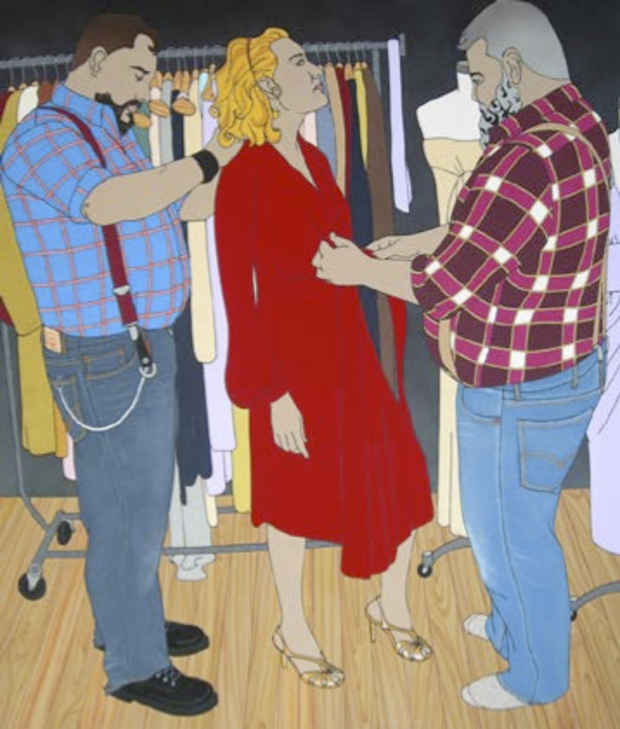“Queer Threads: Crafting Identity and Community” Exhibition
Leslie-Lohman Museum of Gay and Lesbian Art

This event has ended.
Queer Threads, a group show curated by John Chaich, explores notions of aspiration, socialization, and representation within the LGBTQ community through artists employing thread-based craft materials, techniques, and processes.
While many of these artists are internationally recognized in the craft and art communities, this exhibition marks the first time these works have been shown together to specifically highlight their queerness. Comprised from a mix of well-established and emerging talent from across the United States, as well as Argentina, Canada, and South Africa, this exhibition will feature artists Chris Bogia (New York), Melanie Braverman (Massachusetts), Jai Andrew Carrillo (California), Chiachio & Giannone (Argentina), Liz Collins (New York), Ben Cuevas (California), Pierre Fouché (South Africa), James Gobel (California), Jesse Harrod (Virginia), Larry Krone (New York), Rebecca Levi (New York), Aubrey Longley-Cook (Georgia), Aaron McIntosch (Maryland), Allyson Mitchell (Canada), John Thomas Paradiso (Maryland), Sheila Pepe (New York), Maria E. Piñeres (California), Allen Porter (deceased), L. J. Roberts (New York), Sonny Schneider (Denmark), Buzz Slutzky (New York), Nathan Vincent (New York), and Jessica Whitbread (Canada).
Queer Threads will fully activate the Museum’s gallery through felt paintings, yarn drawings, embroidered portraits, knit sculpture, quilted tapestries, and crocheted installations, as well as video. From Nathan Vincent’s life-sized crocheted men’s locker room, to Liz Collin’s oversized knit pride flag based on Gilbert Baker’s 1978 original design, works range from intimate to expansive in scale. From Allyson Mitchell’s found afghans emblazoned with phrases such as “Pride is a Pyramid Scheme,” to James Gobel’s use of felt, acrylic, and yarn to create a portrait of fashion design team Costello Tagliapietra, many of Queer Threads’ artists mix craft technique or materials with traditional mediums, while others fully employ craft processes.
 Flowing off the wall to the floor, L.J. Roberts’ The Queer Houses of Brooklyn in the Three Towns of Breukelen, Boswyck and Midwout during the 41st Year of the Stonewall Era, particularly exemplifies the use of craft techniques to explore contemporary queer culture as it incorporates knitting, embroidery, and quilting to create a colorful, multi-textured sculpture mapping queer, cohabitating collectives. With references to the AIDS quilt and ACT UP iconography, the piece honors punk DIY aesthetics and traditional craft, as well as the families we create. This work is on loan from the Smithsonian American Art Museum who purchased the piece after it was shown in its 2013 40 Under 40: Craft Futures exhibition.
“The new visions and voices in Queer Threads, uniquely expressed through craft traditions, expand on Leslie-Lohman’s commitment to examining the diversity of the LGBTQ experience through art,” says Hunter O’Hanian, Executive Director. In doing so, Chaich notes, “Using craft to celebrate and critique identity and community is very queer in all senses of the word—unusual, political, and personal.”
A range of guest docents will lead tours of the exhibition, including fashion design team Costello Tagliapietra; Debbie Stoller, author of the Stitch n’ Bitch Nation series of knitting books and editor-in-chief of BUST magazine, and designer Todd Oldham, creator of the Kid Made Modern series of books and supplies.
Note: Due to the nature of the artwork, no food or beverages will be allowed in the Museum during this exhibition.
[Image: James Gobel, The Fitting No. 1, 2007, Felt, yarn and acrylic on canvas, 84 x 72 in. Collection of Costello & Tagliapietra. Photo credit: courtesy of Kravits/Wehby.]
Media
Schedule
from January 17, 2014 to March 16, 2014
Opening Reception on 2014-01-17 from 18:00 to 20:00
Artist(s)
Chris Bogia, Melanie Braverman, Jai Andrew Carrillo, Chiachio & Giannone, Liz Collins, Ben Cuevas, Pierre Fouché, James Gobel, Jesse Harrod, Larry Krone, Rebecca Levi, Aubrey Longley-Cook, Aaron McIntosch, Allyson Mitchell, John Thomas Paradiso, Sheila Pepe, Maria E. Piñeres, Allen Porter, L. J. Roberts, Sonny Schneider, Buzz Slutzky, Nathan Vincent, Jessica Whitbread